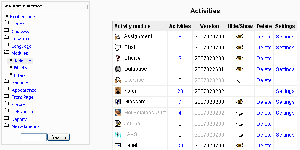Activity modules administration: Difference between revisions
Helen Foster (talk | contribs) m (Module configuration moved to Activity modules administration) |
(M2 location) |
||
| (12 intermediate revisions by 3 users not shown) | |||
| Line 1: | Line 1: | ||
In Moodle 2.0 'Site Administration > Plugins > Activities modules > Manage activities'' | |||
Pre Moodle 2.0 Location: ''Administration > Modules > Activities > Manage activities'' | |||
[[Image:activity modules admin.png|thumb|Activity modules administration]] | |||
The activities page | The manage activities page enables the administrator to manage Moodle's activity modules for the entire site. This includes standard modules and contributed modules that have been added by the site administrator. | ||
==Number of activities== | |||
The activities column lists how many activities for each module there are on your Moodle site. If you click on a number, the list of courses containing that activity will be displayed. | |||
*[[Assignment | ==Hiding a module== | ||
*[[Chat | The hide/show column allows selected modules to be hidden i.e. they do not appear in any course "Add an activity" dropdown menu and cannot be used in any course. To hide a module, click the eye icon so that it changes to a closed eye. | ||
*[[Database | |||
*[[Forum | For various reasons, several modules are hidden by default. For example, the [[Exercise]] and Journal modules are old modules, which are no longer maintained, but are included in Moodle for historical reasons. | ||
*[[Glossary | |||
*[[Hotpot | ==Module deletion== | ||
*[[LAMS | |||
*[[Quiz | Apart from the [[Forum module]], any module can be deleted using the link in the delete column. There is no reason for standard modules to be deleted, however contributed modules may need to be deleted before upgrading. | ||
*[[Resource | |||
*[[SCORM/AICC | Note: To delete a module completely, in addition to deleting it on the manage activities page, you also need to remove/delete the actual module folder from the ''moodle/mod'' folder, otherwise Moodle will reinstall it next time you access the site administration. | ||
==Module settings== | |||
Many of the modules have additional settings, which can be accessed via the links in the settings column. For example: | |||
*[[Assignment settings]] | |||
*[[Chat settings]] | |||
*[[Database module settings]] (from 1.6 onwards) | |||
*[[Forum settings]] | |||
*[[Glossary settings]] | |||
*[[Hotpot settings]] (from 1.6 onwards) | |||
*[[LAMS settings]] (from 1.6 onwards) | |||
*[[Quiz settings]] | |||
*[[Resource settings]] | |||
*[[SCORM/AICC settings]] | |||
==Contributed modules== | |||
In addition to using the wide variety of modules included in the standard download, you can download and install contributed modules and plugins from the Moodle.org [http://moodle.org/mod/data/view.php?id=6009 Modules and plugins database]. | |||
Warning: Be aware that contributed modules may have quality issues, may not work correctly, and may not work when you upgrade Moodle. You should test them thoroughly before using them and be prepared to uninstall them before upgrading. | |||
==See also== | ==See also== | ||
*[[Module security]] | |||
*[[:Category: | *[[:Category:Contributed code]] | ||
[[Category:Administrator]] | [[Category:Administrator]] | ||
[[Category:Modules]] | [[Category:Modules]] | ||
[[eu:Moduluak_(Kudeatzailea)]] | |||
[[fr:Modules (administrateur)]] | [[fr:Modules (administrateur)]] | ||
[[ja:モジュール管理 (管理者)]] | [[ja:モジュール管理 (管理者)]] | ||
Latest revision as of 12:43, 9 December 2010
In Moodle 2.0 'Site Administration > Plugins > Activities modules > Manage activities
Pre Moodle 2.0 Location: Administration > Modules > Activities > Manage activities
The manage activities page enables the administrator to manage Moodle's activity modules for the entire site. This includes standard modules and contributed modules that have been added by the site administrator.
Number of activities
The activities column lists how many activities for each module there are on your Moodle site. If you click on a number, the list of courses containing that activity will be displayed.
Hiding a module
The hide/show column allows selected modules to be hidden i.e. they do not appear in any course "Add an activity" dropdown menu and cannot be used in any course. To hide a module, click the eye icon so that it changes to a closed eye.
For various reasons, several modules are hidden by default. For example, the Exercise and Journal modules are old modules, which are no longer maintained, but are included in Moodle for historical reasons.
Module deletion
Apart from the Forum module, any module can be deleted using the link in the delete column. There is no reason for standard modules to be deleted, however contributed modules may need to be deleted before upgrading.
Note: To delete a module completely, in addition to deleting it on the manage activities page, you also need to remove/delete the actual module folder from the moodle/mod folder, otherwise Moodle will reinstall it next time you access the site administration.
Module settings
Many of the modules have additional settings, which can be accessed via the links in the settings column. For example:
- Assignment settings
- Chat settings
- Database module settings (from 1.6 onwards)
- Forum settings
- Glossary settings
- Hotpot settings (from 1.6 onwards)
- LAMS settings (from 1.6 onwards)
- Quiz settings
- Resource settings
- SCORM/AICC settings
Contributed modules
In addition to using the wide variety of modules included in the standard download, you can download and install contributed modules and plugins from the Moodle.org Modules and plugins database.
Warning: Be aware that contributed modules may have quality issues, may not work correctly, and may not work when you upgrade Moodle. You should test them thoroughly before using them and be prepared to uninstall them before upgrading.
